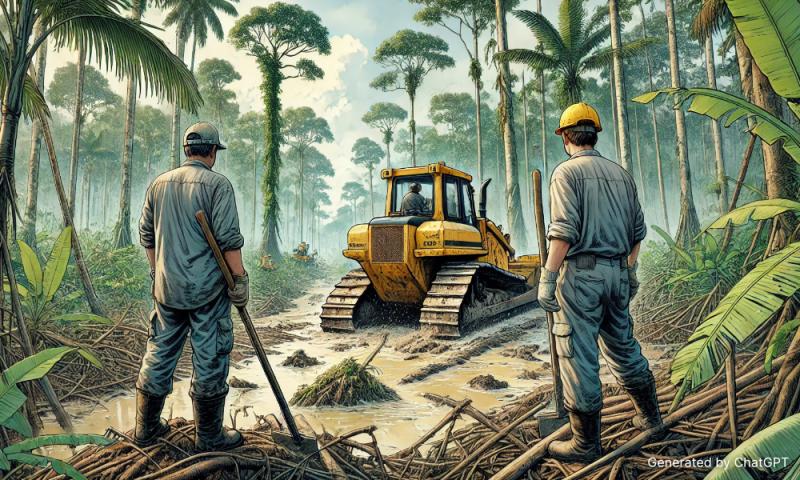
T'ganu royalty-linked project sparks environmental concerns
Low Choon Chyuan
Published: Sep 4, 2024 3:59 PM
Two months ago, “Pure Green Development Sdn Bhd” submitted an environmental impact assessment (EIA) to develop an oil palm plantation in the forests of the Kuala Nerus district in Terengganu.
And this project raised eyebrows.
Apart from the impact on the forests, concerns were raised in the EIA about potential flooding and effects on water supply during droughts.
Another piece of information also surfaced from the EIA - Pure Green belongs to Tengku Baderul Zaman, who is the brother of Terengganu ruler Sultan Mizan Zainal Abidin.
Baderul holds a 30 percent stake while Tan Khian Huat, Tam Piak Hock and Tam Tian Ting hold the remaining shares.
The EIA also revealed that the sultan, who owns a different firm, is clearing the adjacent forest.
Two forests are involved - the Belara forest reserve and the adjacent peat swamp forest to its west - both located in Mukim Pakoh.
What’s brewing in Belara?
According to the Terengganu Forestry Department in 2016, the Belara forest reserve originally spanned 4,589ha.
The adjacent peat swamp forest is 2,229ha. The total area of the forests is 6,818ha.
However, the Belara forest reserve has been shrinking for the past seven years due to the degazetting of its forest reserve status and new logging projects.
At the same time, the adjacent peat swamp forest is at risk due to Pure Green’s proposed plantation project.
On Aug 17, 2017, the Terengganu state government gazetted to remove the forest reserve status of three forest parcels in the Belara forest - numbered PT 10175, PT 10176 and PT 10177 - and convert them into agricultural land.
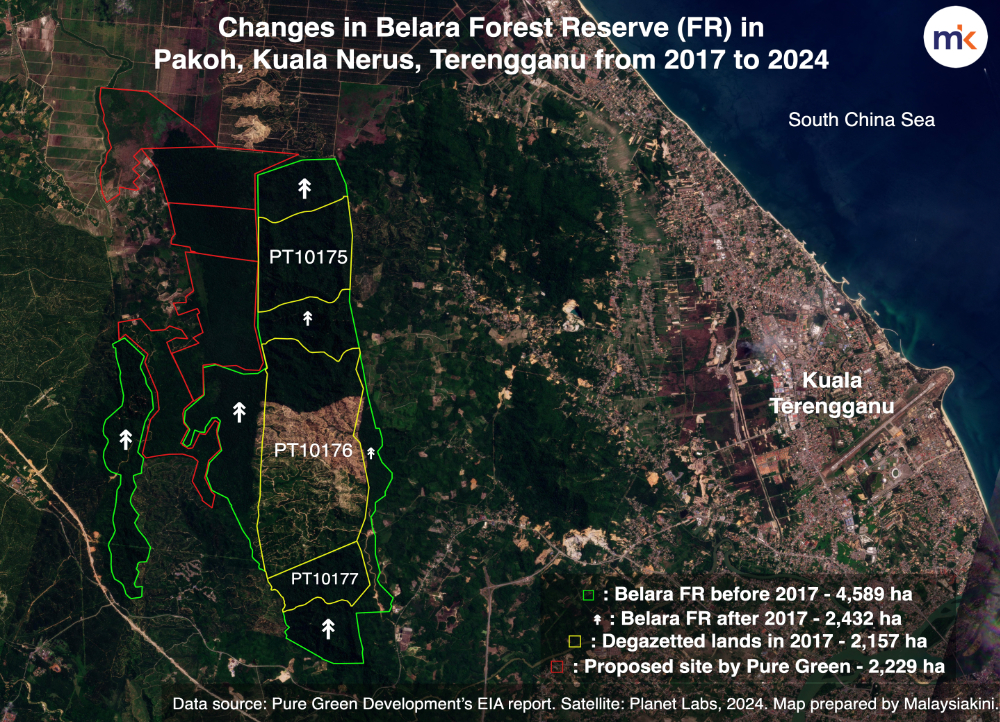
As a result, the remaining main block of the Belara forest reserve was “chopped” into four smaller blocks, and its total area was reduced by 47 percent to 2,432ha.
Cutting down forests without plan
The degazettement has also paved the way for future logging operations in the Belara forest.
In 2020, a company called Cahaya Ikhtiar Sdn Bhd obtained permission from the Environment Department (DOE) to cut down about 800ha of forest on Lot 10176.
Malaysiakini found that Cahaya Ikhtiar is an oil palm plantation company. Its sole owner is the Terengganu ruler.
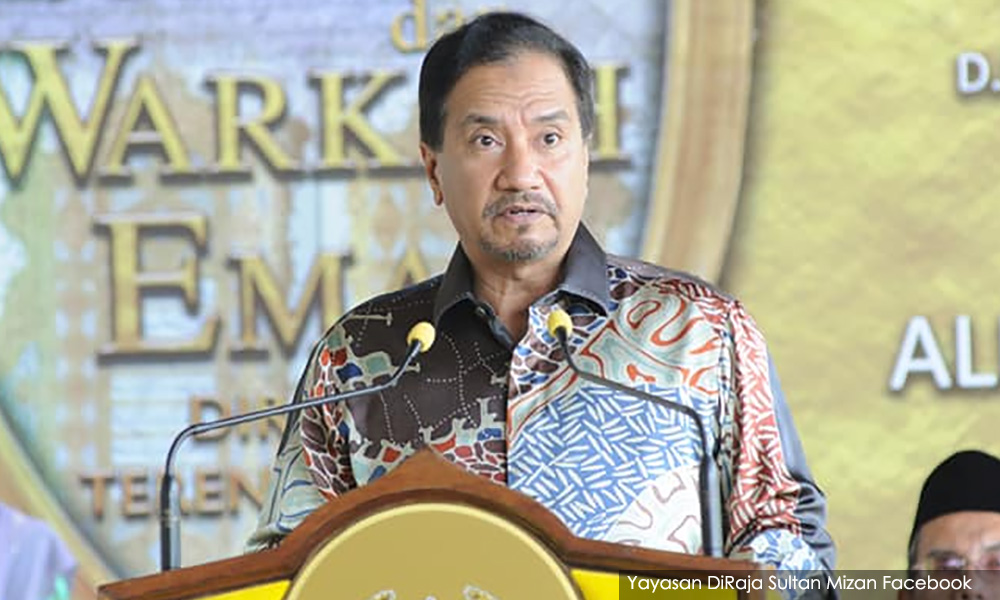
Sultan Mizan Zainal Abidin
According to Forest Tracker published by Rimbawatch, DOE approved at least two EIA reports from Cahaya Ikhtiar for logging activities by the end of 2020.
The areas involved were less than 500ha and did not require public consultation.
READ MORE: Loophole for developers: Cutting forest reserve projects into small pieces
In February 2021, large-scale logging activities occurred on PT 10176 land and 883ha were cleared in the next three years.
The Terengganu state government explained in the 2017 Auditor-General’s Report that the degazettement of Belara’s forest reserve status was intended to develop oil palm plantations and increase state government revenue.
However, the explanation itself was confusing as while Cahaya Ikhtiar positioned itself as a plantation company, the EIA reports it submitted were categorised under “logging” instead of “plantation”.
Latest plantation project by sultan’s brother?
Coming to this year, Pure Green submitted an EIA report in mid-June, seeking to clear the peat swamp forest to develop an oil palm plantation.
The landowner of the peat swamp forest is Lembaga Tabung Amanah Warisan Negeri Terengganu, which is owned by the Terengganu state government and chaired by the menteri besar.
On May 25, 2022, the Terengganu State Assembly Council (MMKN) decided to lease the proposed project area to Pure Green for 99 years for agricultural purposes. Ahmad Samsuri Mokhtar from PAS had become menteri besar by then.
According to Forest Tracker published by Rimbawatch, DOE approved at least two EIA reports from Cahaya Ikhtiar for logging activities by the end of 2020.
The areas involved were less than 500ha and did not require public consultation.
READ MORE: Loophole for developers: Cutting forest reserve projects into small pieces
In February 2021, large-scale logging activities occurred on PT 10176 land and 883ha were cleared in the next three years.
The Terengganu state government explained in the 2017 Auditor-General’s Report that the degazettement of Belara’s forest reserve status was intended to develop oil palm plantations and increase state government revenue.
However, the explanation itself was confusing as while Cahaya Ikhtiar positioned itself as a plantation company, the EIA reports it submitted were categorised under “logging” instead of “plantation”.
Latest plantation project by sultan’s brother?
Coming to this year, Pure Green submitted an EIA report in mid-June, seeking to clear the peat swamp forest to develop an oil palm plantation.
The landowner of the peat swamp forest is Lembaga Tabung Amanah Warisan Negeri Terengganu, which is owned by the Terengganu state government and chaired by the menteri besar.
On May 25, 2022, the Terengganu State Assembly Council (MMKN) decided to lease the proposed project area to Pure Green for 99 years for agricultural purposes. Ahmad Samsuri Mokhtar from PAS had become menteri besar by then.
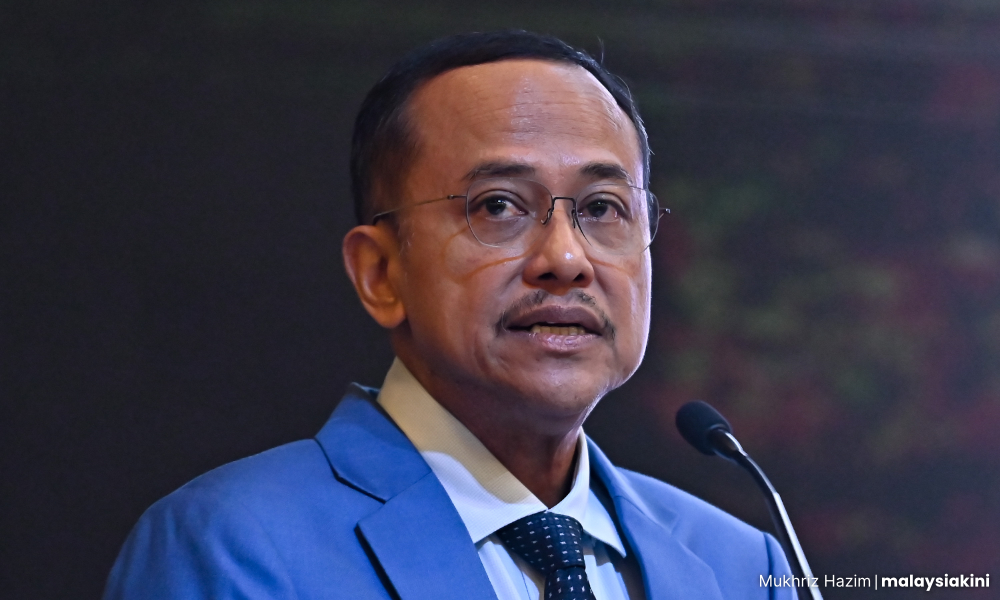
Terengganu Menteri Besar Ahmad Samsuri Mokhtar
The Terengganu state government has also provided numerous perks for Pure Green, including slashing the land premium price by 50 percent compared to the market price.
Pure Green was further exempted from paying the lease for the first three years, saving the firm RM2 million.
Malaysiakini has reached out to the Terengganu palace and Pure Green for a response. Apart from emails, letters requesting comments have also been posted.
Harvested woods, low economic value
The latest project is rather bizarre especially when it comes to its profit model and what drives Pure Green to develop the oil palm project.
The peatland forest Pure Green is eyeing covers an area of 2,229ha, equivalent to 4,165 football fields, which is about half the area of Putrajaya.
In the case of Sultan Mizan’s Cahaya Ikhtiar, although it may not be able to plant and sell oil palm in the future, at least the initial logging can bring profit.
However, Baderul’s development of peatland forests does not show any revenue prospects.
The consultants who penned the EIA report stated that interviews with experienced loggers found that wood from peat swamp land has no economic value and sawmills do not accept them.
“The area was logged three times, it has minimal economic value, (the wood) can be crushed and converted into biomass and pallets,” stated the report.
Pure Green will also face challenges in making profits from establishing oil palm plantations there because Malaysian Sustainable Palm Oil (MSPO) prohibits produce from oil palm plantations involved in deforestation after Dec 31, 2019.
The Terengganu state government has also provided numerous perks for Pure Green, including slashing the land premium price by 50 percent compared to the market price.
Pure Green was further exempted from paying the lease for the first three years, saving the firm RM2 million.
Malaysiakini has reached out to the Terengganu palace and Pure Green for a response. Apart from emails, letters requesting comments have also been posted.
Harvested woods, low economic value
The latest project is rather bizarre especially when it comes to its profit model and what drives Pure Green to develop the oil palm project.
The peatland forest Pure Green is eyeing covers an area of 2,229ha, equivalent to 4,165 football fields, which is about half the area of Putrajaya.
In the case of Sultan Mizan’s Cahaya Ikhtiar, although it may not be able to plant and sell oil palm in the future, at least the initial logging can bring profit.
However, Baderul’s development of peatland forests does not show any revenue prospects.
The consultants who penned the EIA report stated that interviews with experienced loggers found that wood from peat swamp land has no economic value and sawmills do not accept them.
“The area was logged three times, it has minimal economic value, (the wood) can be crushed and converted into biomass and pallets,” stated the report.
Pure Green will also face challenges in making profits from establishing oil palm plantations there because Malaysian Sustainable Palm Oil (MSPO) prohibits produce from oil palm plantations involved in deforestation after Dec 31, 2019.
‘No MPOB objections’ despite rule violations
In the EIA, even the Malaysian Palm Oil Board (MPOB) and Plantation and Commodities Ministry objected to Pure Green’s proposed project.
Initially, in the terms of reference (TOR) dated Oct 5, 2023, MPOB pointed out that the proposed project violated MSPO requirements, therefore the products cannot be sold to the market.
MPOB was also concerned that the proposed project would impact international perception about Malaysia improving its environmental credentials.
Responding to these concerns, Pure Green replied that it had received the state government’s approval.
“Approval was given to the project proponent in 2017 to work on the project in Merchant, Marang, but there were some technical problems which caused the project proponent to find alternative land.
“Therefore, the project proponent proposed land in Belara, Kuala Nerus and it has been approved by the Terengganu State Assembly Council.”
Then, in a letter dated Oct 11, 2023, MPOB director-general Ahmad Parveez Ghulam Kadir stated no objections to Pure Green’s project with the condition that the firm complies with the state government’s regulations.
MPOB, in the EIA report, stated that although it plays a critical role in licensing oil palm plantations, “to stop this conversion and planting may not entirely be up to MPOB”. MPOB reminded the federal and state governments to have more synergy regarding land matters.
In a response to Malaysiakini's query, Parveez said: “We (MPOB) already raised our concerns, my letter didn’t support or approve them but just say we have no objections as long as they follow all the rules. We can’t stop them.”
The public feedback period for the EIA report was due on Aug 27 this year and is currently pending the evaluation of the DOE.
‘Natural sponge’ will be destroyed
The TOR of the EIA report revealed concerns of officers from several government agencies, especially that due to management difficulties, the project might not be profitable and has potential failure risks after the proposed forest area is cleared.
For instance, Lembaga Sumber Air Terengganu (Laut) reminded Pure Green that according to the oil palm industry’s “no deforestation, no peat swamp, no exploitation” (NDPE) commitments, oil palm produced by Pure Green cannot be sold.
DOE also noted that oil palm plantations in peat swamp areas are difficult to manage due to the infertile soil. The peat swamp soil cannot support the roots of the palm tree, causing them to fall easily.
Besides this, there is also a fire hazard risk with regard to peat swamp areas and the project owner needs to prepare preventive measures.
In other words, the proposed project could turn out to be a bad venture with Pure Green not making a profit and at the same time, the area is subjected to environmental damage, including the destruction of “natural sponges”.
The EIA report prepared by O&E Technologies pointed out that 66.35 percent or 1,506ha of the project area is peat swamp forest, hence it plays a critical role as a “natural sponge” to reserve water.
Furthermore, 45.32 percent or 1,029ha of the project area is virgin peat swamp forest with no logging history and has high conservation value.
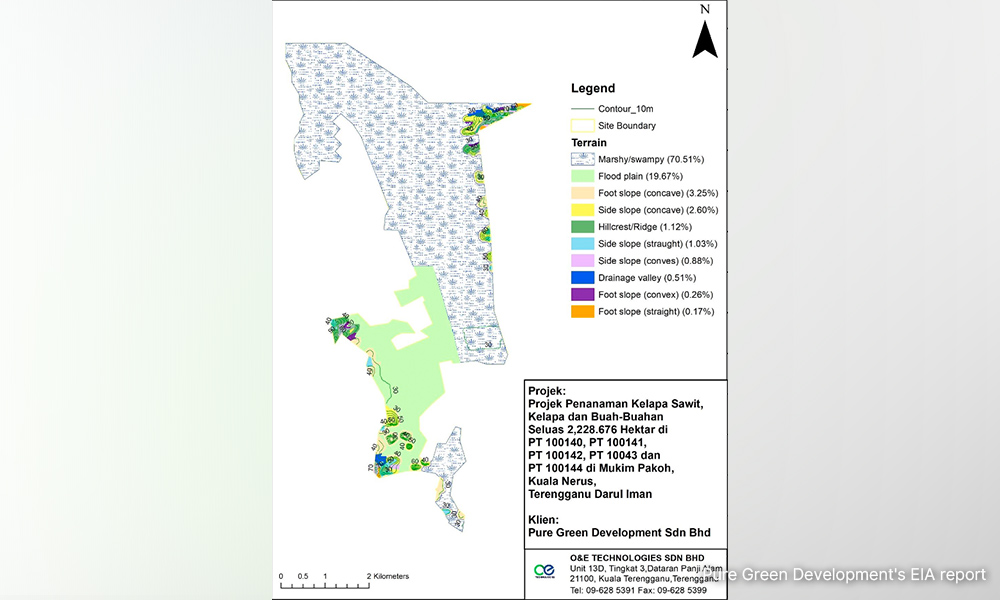
Forest Research Institute Malaysia (Frim) pointed out that peat swamp forests can absorb and retain large amounts of water. It acts as natural flood insulation. If the forest is converted into an oil palm plantation, it could lead to flooding in the surrounding areas.
Laut had similar concerns. Its representative said the proposed area is a reservoir for runoff water from the hills adjacent to it. When the project commences, nearby areas will encounter a higher amount of water flow.
Water crisis for paddy farmers
In addition, there are two river tributaries in the proposed site, namely Sungai Bari and Sungai Mek Sena. The two rivers flow into Sungai Merang and discharge into the South China Sea.
The rivers flow through Kuala Terengganu and the Setiu district. Villages along the rivers such as Kampung Merang are flood-prone areas.
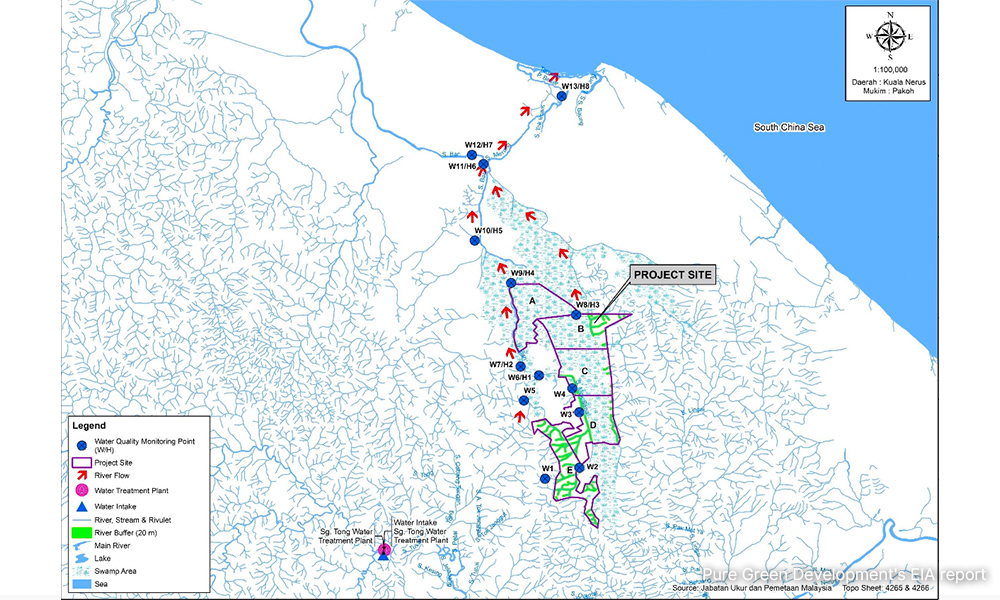
Besides flooding risks, water crisis during drought seasons is another concern.
Laut was worried that once the water reservoir was destroyed, water supply from Sungai Merang would decrease - impacting the aquaculture and paddy farming activities in the downstream areas.
It also pointed out that when the water flow of the river decreases, it would risk saltwater intrusion – affecting the aquaculture and paddy farming activities in downstream areas.
The EIA report warned that human-wildlife conflict in the surrounding human settlements would become more serious once the clearing activities take place.
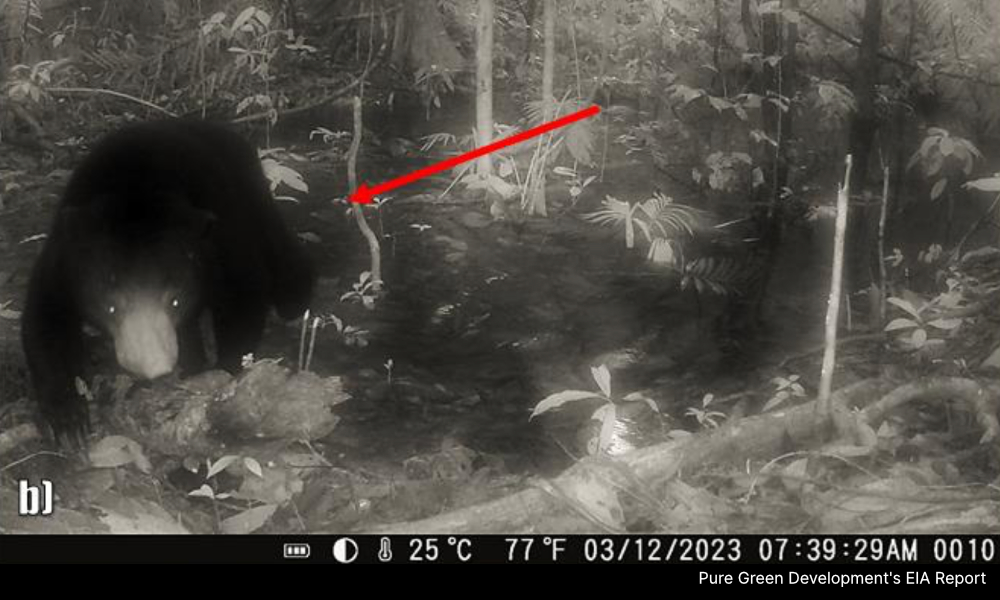
According to the Wildlife and National Parks Department (Perhilitan), from 2019 to 2023, the surrounding 5km radius of the proposed site had reported 29 human-wildlife incidents, involving eight species such as the Malayan tigers, crocodiles, sun bears, wild boars and monkeys.
“Human-wildlife conflicts are expected to occur… special attention should be put on the Indo-Pacific crocodile and Malayan gharial as these species inhabit water-logged areas within the project area and would be totally impacted when the project is initiated due to total habitat loss,” it stated.
Peat swamps are massive carbon sinks, worldwide.
ReplyDeleteDestruction of peat swamps are a big Climate Change No-No